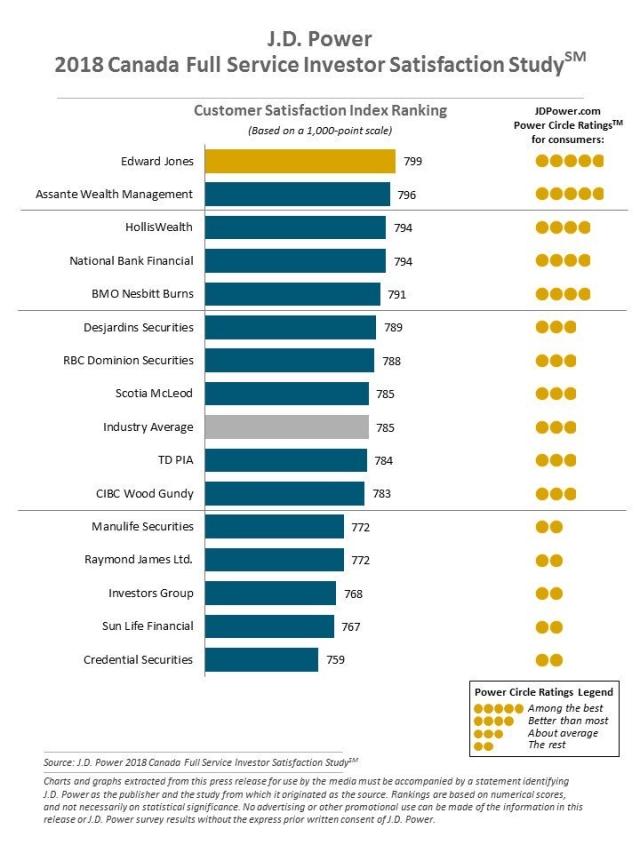Has CRM2 Missed the Mark? Most Investors in Canada Unaware of or Unfamiliar with New Fee and Performance Disclosures, J.D. Power Finds
Edward Jones Tops Investor Satisfaction Ranking for Sixth Consecutive Year
TORONTO: 16 Aug. 2018 — Although the new reporting and disclosure rules requiring wealth management firms to share new information about fees and portfolio performance (CRM2) have now been in full effect for more than a year, 79% of investors in Canada are still unaware of CRM2. Furthermore, according to the J.D. Power 2018 Canadian Full Service Investor Satisfaction Study,SM even among those relatively few investors who are aware of the initiative, slightly fewer than half (49%) have actually noticed the associated changes in the reporting.
“The low awareness and understanding of CRM2 poses an ongoing challenge and opportunity for firms and financial advisors,” said Mike Foy, Senior Director of the Wealth Management Practice at J.D. Power. “While the industry’s concern that the new fee and performance reporting would trigger an exodus of investors hasn’t materialized, the risk of defections still exists. The study suggests that the best way to address that risk is for advisors to be proactively and regularly discussing fees and performance with their clients, rather than leaving them to figure it out on their own.”
The study shows that investors who are aware of CRM2 and have noticed the changes in the reporting format, as well as had their advisor explain the fees within the past 12 months, are not only much more likely than investors overall to understand their fees (55% vs. 32%, respectively, indicate “complete understanding”), but they are also much more loyal to their firm (58% “definitely will” remain with their firm for the next 1-2 years vs. 46%) and are more likely to recommend their firm (53% vs. 37%).
“Advisors continue to be critical of CRM2 achieving goals of greater investor understanding of fees and performance,” Foy said, adding, “and the greater risk for both advisors and firms remains with inaction rather than taking action to engage with clients.”
Following are key findings of the 2018 study:
- Evolving role of the advisor: The role of the financial advisor as well as client expectations are changing, depending in part on the investor’s age. While 15% of Boomers[1] consider themselves “Delegators”—those who cede all decisions to their financial advisors—only 10% of Millennials do the same. Meanwhile, 39% of Millennials consider themselves “Validators,” those who consider their advisor more of a sounding board for their own ideas, vs. just 24% of Boomers.
- Mobile is lagging: More than three-fourths (77%) of investors have not used or have only tried using their wealth management mobile app once. This is a very low adoption and usage rate, compared with other channels as well as other industries. Those who have used the mobile channel rate their experience significantly lower (satisfaction of 716, on a 1,000-point scale) vs. other channels such as phone (808) and online/web (792), suggesting that firms have significant work to do to improve the mobile user experience as well as driving engagement.
- Millennials embrace robo-advisors to save on fees: While awareness of robo-advisors is comparable among Boomers (43%); Gen X (45%); and Millennials (48%), it is the latter who are much more likely to adopt the technology. Nearly one-fourth (22%) of Millennials have used a robo-advice service, compared with only 9% of Gen X investors and 3% of Boomers. More than half (52%) of Millennials using robo-advisors attributed their usage to a desire for lower fees.
Study Rankings
Edward Jones ranks highest in overall satisfaction for a sixth consecutive year, with a score of 799. Assante Wealth Management (796) ranks second, while HollisWealth and National Bank Financial rank third in a tie (794 each). In 2018, overall satisfaction is 785, up from 771 in 2017.
The 2018 Canadian Full Service Investor Satisfaction Study measures overall investor satisfaction with full-service investment firms and financial institutions that offer wealth management and private banking services. The study was fielded in May-June 2018 and is based on responses from more than 4,400 investors who work with a financial advisor on their primary investment account.
For information about the Canadian Full Service Investor Satisfaction Study, visit http://canada.jdpower.com/resource/canadian-full-service-investor-satisfaction-study.
J.D. Power is a global leader in consumer insights, advisory services and data and analytics. These capabilities enable J.D. Power to help its clients drive customer satisfaction, growth and profitability. Established in 1968, J.D. Power is headquartered in Costa Mesa, Calif., and has offices serving North/South America, Asia Pacific and Europe. J.D. Power is a portfolio company of XIO Group, a global alternative investments and private equity firm headquartered in London, and is led by its four founders: Athene Li, Joseph Pacini, Murphy Qiao and Carsten Geyer.
Media Relations Contacts
Gal Wilder, Cohn & Wolfe, Toronto, Canada; 647-259-3261, gal.wilder@cohnwolfe.ca
Sandy Caetano, Cohn & Wolfe; Toronto, Canada; 647-259-3288, sandy.caetano@cohnwolfe.ca
Geno Effler; Costa Mesa, Calif.; 714-621-6224; media.relations@jdpa.com
About J.D. Power and Advertising/Promotional Rules www.jdpower.com/about-us/press-release-info
[1] J.D. Power defines generational groups as Pre-Boomers (born before 1946); Boomers (1946 to 1964); Gen X (1965-1976); and Gen Y (1977-1994). Xennials (1978-1982) and Millennials (1982-1994) are subsets of Gen Y.
